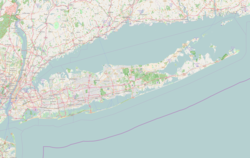North New Hyde Park is a hamlet and census-designated place (CDP) in the Town of North Hempstead in Nassau County, on Long Island, in New York, United States. The population was 15,657 at the 2020 census.
North New Hyde Park, New York | |
|---|---|
 A street in North New Hyde Park on May 24, 2021. | |
 Location in Nassau County and the state of New York. | |
| Coordinates: 40°44′44″N 73°41′17″W / 40.74556°N 73.68806°W | |
| Country | |
| State | |
| County | Nassau |
| Town | North Hempstead |
| Named for | Its location north of New Hyde Park |
| Area | |
• Total | 2.01 sq mi (5.21 km2) |
| • Land | 1.99 sq mi (5.16 km2) |
| • Water | 0.02 sq mi (0.06 km2) |
| Elevation | 115 ft (35 m) |
| Population (2020) | |
• Total | 15,657 |
| • Density | 7,863.89/sq mi (3,036.01/km2) |
| Time zone | UTC-5 (Eastern (EST)) |
| • Summer (DST) | UTC-4 (EDT) |
| ZIP code | 11040, 11042 |
| Area codes | 516, 363 |
| FIPS code | 36-53275 |
| GNIS feature ID | 0958861 |
| Website | www |
Portions of the area are also known as Floral Park Centre and Lakeville Estates.
History
editThe hamlet's name reflects the fact that it is located immediately north of New Hyde Park.[2]
The Lake Success Shopping Center, located on Union Turnpike within the hamlet, opened in 1956 and was designed by A.H. Salkowitz.[3][4][5]
Geography
editAccording to the United States Census Bureau, North New Hyde Park has a total area of 2.0 square miles (5.2 km2), all land.[6]
As aforementioned, the areas known as Floral Park Centre and Lakeville Estates are located within the boundaries of North New Hyde Park.[7]
Demographics
edit| Census | Pop. | Note | %± |
|---|---|---|---|
| 2000 | 14,542 | — | |
| 2010 | 14,889 | 2.4% | |
| 2020 | 15,657 | 5.2% | |
| U.S. Decennial Census[8] | |||
2010 census
editAs of the census of 2010, there were 14,889 people residing in the CDP.[9][10] The racial makeup of the CDP was 65.67% White, 0.72% African American, 0.26% Native American, 29.14% Asian, 0% Pacific Islander, 2.04% from other races, and 2.16% from two or more races. Hispanic or Latino of any race were 7.24% of the population.
Census 2000
editAs of the census of 2000, there were 14,542 people, 5,032 households, and 4,055 families residing in the CDP.[9] The population density was 7,350.1 inhabitants per square mile (2,837.9/km2). There were 5,116 housing units at an average density of 2,585.8 per square mile (998.4/km2). The racial makeup of the CDP was 82.38% White, 0.33% African American, 0.14% Native American, 14.83% Asian, 0.02% Pacific Islander, 1.22% from other races, and 1.07% from two or more races. Hispanic or Latino of any race were 4.86% of the population.
There were 5,032 households, out of which 32.5% had children under the age of 18 living with them, 68.9% were married couples living together, 9.0% had a female householder with no husband present, and 19.4% were non-families. 17.9% of all households were made up of individuals, and 12.0% had someone living alone who was 65 years of age or older. The average household size was 2.89 and the average family size was 3.28.
In the CDP, the population was spread out, with 22.0% under the age of 18, 6.5% from 18 to 24, 25.4% from 25 to 44, 26.5% from 45 to 64, and 19.7% who were 65 years of age or older. The median age was 43 years. For every 100 females, there were 89.9 males. For every 100 females age 18 and over, there were 87.4 males.
The median income for a household in the CDP was $69,792, and the median income for a family was $80,688. Males had a median income of $53,667 versus $42,162 for females. The per capita income for the CDP was $31,998. About 1.8% of families and 2.7% of the population were below the poverty line, including 3.1% of those under age 18 and 4.0% of those age 65 or over.
Education
editThe CDP is divided among these school districts:[11]
Notable person
edit- Michael J. Tully, Jr. – Former New York State Senator and Supervisor of the Town of North Hempstead; lived at 113 Patton Boulevard.[12]
See also
editReferences
edit- ^ "ArcGIS REST Services Directory". United States Census Bureau. Retrieved September 20, 2022.
- ^ Winsche, Richard (October 1, 1999). The History of Nassau County Community Place-Names. Interlaken, New York: Empire State Books. ISBN 978-1557871541.
- ^ "A.H. Salkowitz | Queens Modern". queensmodern.com. Retrieved April 1, 2024.
- ^ "BIG NASSAU STORE FOR NAMM-LOESER: Lease Taken for 42 Years at 20-Acre Shopping Center in Lake Success Area NEAR THE SPERRY PLANT Peck and Shactman Sponsoring Union Turnpike Project -Parking for 1,500 Cars". The New York Times. December 27, 1953. pp. R1 – via ProQuest.
- ^ Appeals, New York (State) Court of (1955). New York Court of Appeals. Records and Briefs.
- ^ "US Gazetteer files: 2010, 2000, and 1990". United States Census Bureau. February 12, 2011. Retrieved April 23, 2011.
- ^ "Nassau News Briefs". Newsday. September 17, 1952 – via ProQuest.
- ^ "Census of Population and Housing". Census.gov. Retrieved June 4, 2016.
- ^ a b "U.S. Census website". United States Census Bureau. Retrieved January 31, 2008.
- ^ "North New Hyde Park, NY Population - Census 2010 and 2000 Interactive Map, Demographics, Statistics, Quick Facts - CensusViewer". censusviewer.com. Retrieved September 7, 2021.
- ^ "2020 CENSUS - SCHOOL DISTRICT REFERENCE MAP: Nassau County, NY" (PDF). U.S. Census Bureau. Retrieved November 10, 2023.
- ^ Bender, Judith (October 9, 1975). "Tully Fighting Charge About Practice of Law". p. 24 – via ProQuest.

